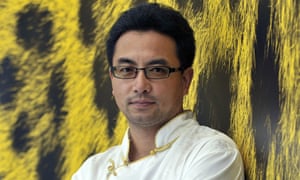Tibetan director 'injured in Chinese police custody'
Chinese film-makers and activists have demanded answers over claims that an award-winning Tibetan director was taken to hospital in western China with injuries sustained while in police custody.
Pema Tseden, whomade the first feature film entirely in the Tibetan language, was “forcibly taken away by police” on 25 June in Xining, the capital of Qinghai province, China’s film directors guild said in a statement on Wednesday. Two days after being detained at the city’s airport, the 46-year-old was taken to hospital, having sustained injuries while in custody, the guild claimed.
“We hope Pema Tseden is safe and sound, and we hope that this situation will be resolved in a just and appropriate manner,” the statement added, according to a translation posted on the blog of Tricia Kehoe, a British Tibet scholar.
Coco, the Tibetan film-maker’s producer, who is also known as Sonam, told the Guardian that the director had been detained following an altercation with airport security officers.
Police subsequently asked the director to sign a confession admitting he had “disturbed the social order”. When he refused, a police officer told him “disobedient” people like him would be detained.
Coco said he visited the director two days after at a detention centre in Xining and saw “many injuries to his wrist and hand” caused by handcuffs. Tseden complained of high blood pressure, pains in his chest and heart, and losing feeling in several fingers, the producer claimed.
The son of Tibetan nomads, Tseden studied at the Beijing Film Academy and made his cinematic debut with The Silent Holy Stones, the first feature film entirely in Tibetan.
In an interview with the US National Public Radio in 2009, the Beijing-based director, who was a member of the jury at this month’s Shanghai international film festival, said he hoped to change perceptions of the Himalayan region through his films.
“I think Tibet has always been mythologised and worshipped, and made more remote. People’s psychological expectations and experiences of Tibet are stuck in the past. They don’t understand the new Tibet.”
Speaking to Agence France-Presse last year, he said: “Some people think Tibetans are very mysterious and mystical, that they live in the sky, but through my work I want to show Tibetans are ordinary people and change some people’s thinking.”
Françoise Robin, a Tibet expert who has known Tseden for 15 years, said she was at a loss to explain why he had been picked up by Chinese police. “I just don’t know what happened. He is one of the most quiet and least involved people I have known in anything political,” she said.
“He is a film-maker above all. He is not an activist. He is an artist … He is like any other professional film-maker on the planet … He never talks about politics.”
Robin, a professor of Tibetan studies at the Institute for Oriental Languages and Civilisations in Paris, said Tseden’s alleged mistreatment reflected the way Tibetans were routinely treated by the Chinese authorities.
“This kind of thing happens every day on the Tibetan plateau, I’m afraid to say. What is good for the authorities, usually, is that they get away with it because no one knows … The problem now for the authorities is that they have picked up someone who is famous and maybe they didn’t know.”
She added: “This is just the ultimate proof that China is not a state of law.”
Reports of Tseden’s detention come a day after a report on human rights in Chinawritten for the Conservative party claimed there had been a severe deterioration of the human rights situation in China since Xi Jinping became president in 2013.
Evidence heard by those compiling the report suggested Xi’s rise to power had “unleashed an unprecedented crackdown on civil society, human rights defenders, religious minorities, the media and others”.
Speaking at a press conference on Wednesday, a spokesman for the Chinese foreign ministry rejected those claims and urged British MPs “not to interfere in China’s domestic affairs in any way at all”.
“The report turns a blind eye to the facts and distorts facts about Chinese human rights,” said Hong Lei. “It is not worthy of any comment.”

No comments:
Post a Comment
Comments always welcome!